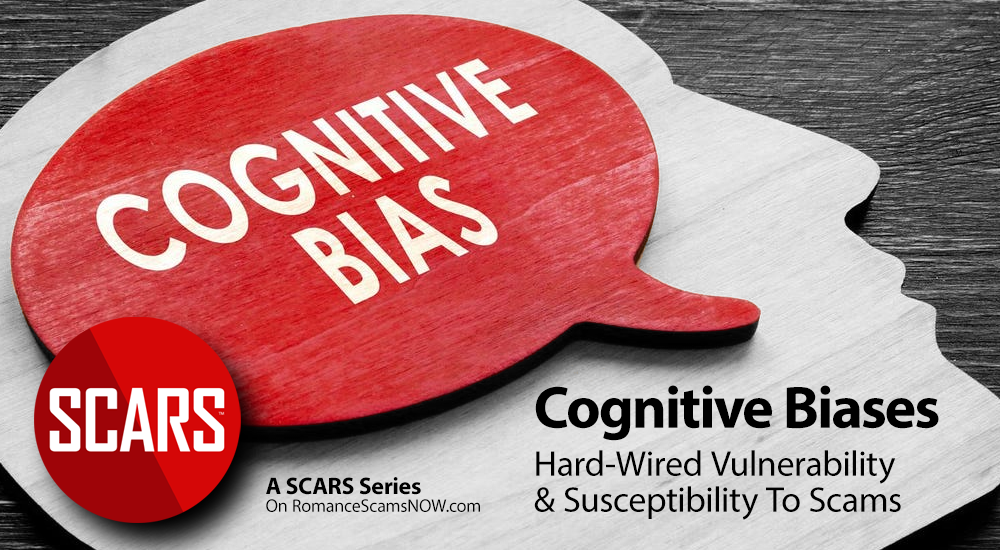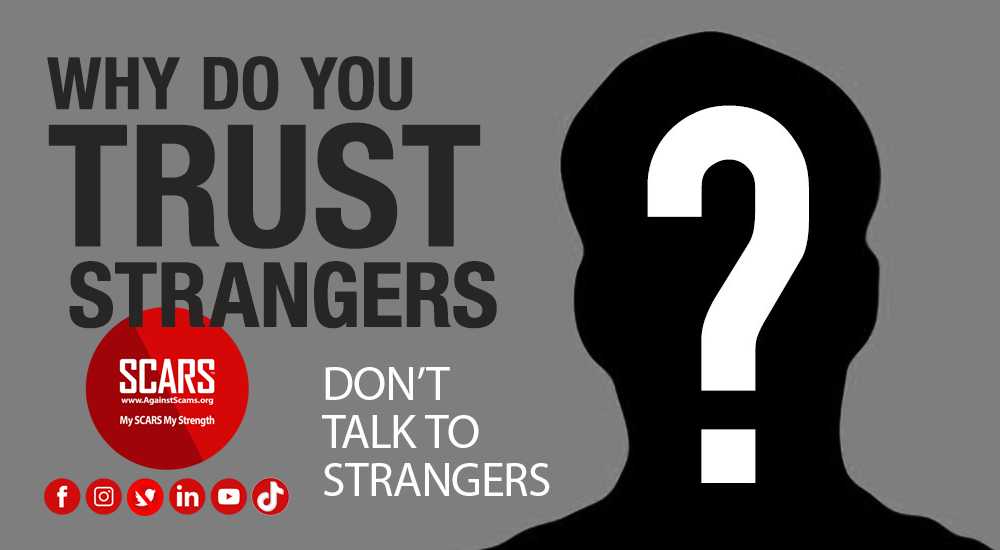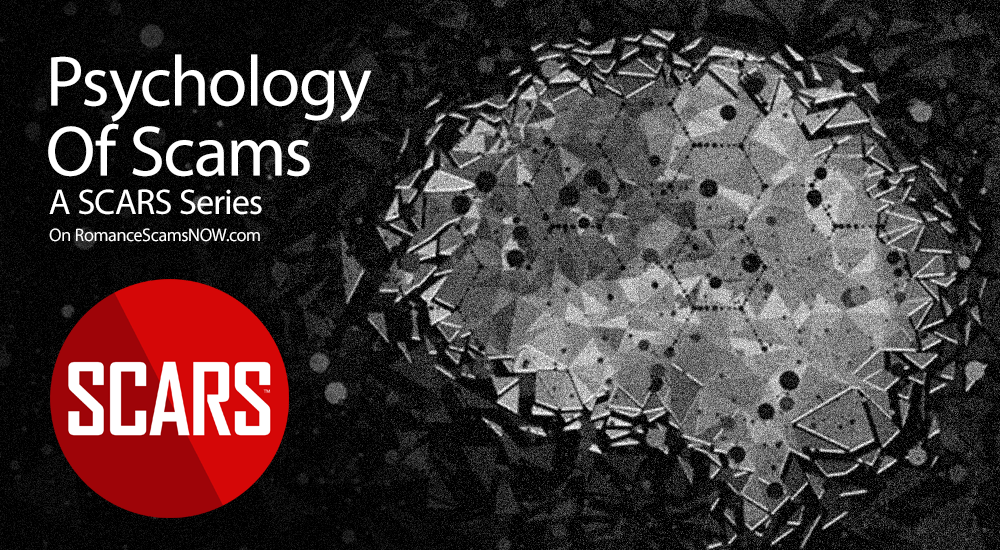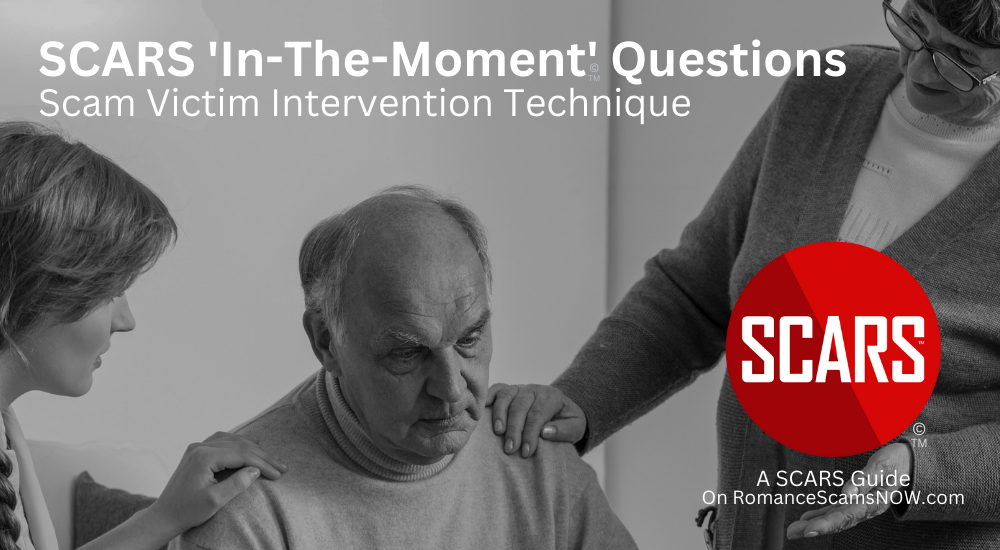Cognitive Biases: Humans Have Great Analytical Powers But We Rarely Use Them!
Normalcy Bias or normality bias is a cognitive bias that leads people to disbelieve or minimize threat warnings.
We Tend To Think Things Are What They Always Will Be!
Every human has these cognitive biases that contribute to our vulnerabilities! Does that sound like you?
Cognitive biases are what makes people disregard threats of natural disasters and stay in place. It makes them ignore threats to their physical safety in situations of high risk. It also helps them ignore clearly visible red flags before and during a relationship scam. It makes them disregard warnings. They just believe that things were safe and they will continue to be that way.
Consequently, individuals underestimate the likelihood of a disaster, a risk, a threat – when it might affect them, and its potential adverse effects (consequence).
The normalcy bias is yet another cognitive bias that causes many people to ignore or inadequately prepare for natural disasters, market crashes, financial collapses, loss of a job, scams and being re-scammed, and calamities caused by human error. About 70% of people (reportedly) display normalcy bias during a disaster. About 100% of scam victims display this bias – and it also affects their recovery too.
The normalcy bias can manifest in response to warnings about disasters and actual catastrophes. Such disasters include market crashes, motor vehicle accidents, natural disasters like a tsunami, and war. Every parent has seen this in their teens who ask to use the family car – immature minds (which includes most politicians) display this bias.
Do not confuse this with “Confirmation Bias” – this is different.
Normalcy & Overreaction Cognitive Bias
Normalcy bias has also been called “analysis paralysis”, the “ostrich effect”, and by first responders, the “negative panic”. The opposite of normalcy bias is “overreaction”, or “worst-case scenario bias”, in which small deviations from normality are dealt with as signals of an impending catastrophe.
The normalcy bias is a cognitive bias that affects the way people perceive and respond to potential threats or disasters. It refers to the tendency for people to assume that things will always continue to function the way they have in the past, even in the face of evidence to the contrary.
This cognitive bias is often observed in situations where people are faced with a sudden and unexpected event, especially a traumatic event, such as a natural disaster, terrorist attack, relationship scam, or other crisis. In these situations, people may be slow to recognize the severity of the situation or to take action to protect themselves, because they are assuming that everything will eventually return to normal.
One of the main reasons why the normalcy bias is so pervasive is that it is rooted in human psychology. Our brains are wired to seek out patterns and to rely on past experiences to inform our decisions about the future. This can be a useful strategy in many situations, as it allows us to navigate complex environments and make decisions quickly and efficiently.
However, this same strategy can also lead to cognitive biases, such as the normalcy bias (cognitive bias). When we are faced with a situation that is outside of our normal range of experience, our brains may struggle to process the information and to adjust our expectations accordingly. As a result, we may default to assuming that everything will eventually return to normal, even if the evidence suggests otherwise.
The normalcy bias can have serious consequences in emergency situations. For example, people may fail to evacuate or take other protective measures when they are warned about an impending disaster or traumatic event because they assume that it will not be as severe as the warnings suggest. This can put them at risk of injury or even death.
The normalcy bias can also affect decision-making in other areas of life. For example, people may be slow to recognize changes in their health or to seek medical attention, because they assume that any symptoms they are experiencing are temporary and will go away on their own. Similarly, people may fail to take action to address climate change or other long-term threats, because they assume that the status quo will continue indefinitely.
There are several strategies that can be used to overcome the normalcy bias. One of the most effective is to actively seek out information that challenges our assumptions and expectations. This can include seeking out diverse perspectives and sources of information, as well as actively questioning our own assumptions and biases.
Another strategy is to practice mindfulness and self-awareness, in order to become more attuned to our own cognitive processes and to be able to recognize when we may be falling victim to cognitive biases such as the normalcy bias. This can involve techniques such as meditation, journaling, or other forms of introspection.
Finally, it is important to cultivate a sense of resilience and adaptability in the face of uncertainty and change. This can involve developing skills and strategies that allow us to respond effectively to unexpected events, such as emergency preparedness plans, financial contingency plans, or other forms of risk management.
How It Works
These common response patterns of people’s future disasters, threats, and catastrophic events (such as the discovery of a crime/scam) demonstrate that there are three phases of response – these are the THREE-Ds:
- denial
- deliberation
- decisive moment
Do not confuse these with grief – they are different, but certainly, impact the grief cycle and trauma.
DENIAL
In the Denial phase of this cognitive bias, people are likely to deny that a disaster/crime/event was/is/did happen/happening. It takes time for the brain to process information and recognize that a threat is real.
DELIBERATION
In the Deliberation phase of this cognitive bias, people have to decide what to do. If a person does not have a plan in place or pre-existing learned behaviors, meaning they have not developed defensive or responsive behaviors, then this causes a serious problem because of the effects of this threatening stress on the body (e.g. tunnel vision, audio exclusion, time dilations, out-of-body experiences, or reduced motor skills) – it limits an individual’s ability to perceive information and make plans.
DECISIVE MOMENT
In the third and final phase, described as the “decisive moment” of this cognitive bias, a person must act quickly and decisively. Failure to do so can result in harm, possible injury or even death. The faster someone can get through the denial and deliberation phases, the quicker they will reach the decisive moment and begin to take action.
This can be heavily influenced by past traumas letting the amygdala to respond and take control emotionally.
This article is by:
SCARS™ – Society of Citizens Against Relationship Scams Inc.
A scams & financial fraud crime victims assistance & crime prevention nonprofit organization headquartered in Miami Florida USA & Monterrey NL Mexico, with partners in more than 60 countries worldwide
If you are a Victim sign up for our FREE SCARS Support Groups at support.AgainstScams.org
To learn more about SCARS, or to Join, Volunteer, or Donate visit: AgainstScams.org
To see Scammer Photos visit www.ScammerPhotos.com
Contact Us: Contact@AgainstScams.org
Statement About Victim Blaming
Some of our articles discuss various aspects of victims. This is both about better understanding victims (the science of victimology) and their behaviors and psychology. This helps us to educate victims/survivors about why these crimes happened and to not blame themselves, better develop recovery programs, and to help victims avoid scams in the future. At times this may sound like blaming the victim, but it does not blame scam victims, we are simply explaining the hows and whys of the experience victims have.
These articles, about the Psychology of Scams or Victim Psychology – meaning that all humans have psychological or cognitive characteristics in common that can either be exploited or work against us – help us all to understand the unique challenges victims face before, during, and after scams, fraud, or cybercrimes. These sometimes talk about some of the vulnerabilities the scammers exploit. Victims rarely have control of them or are even aware of them, until something like a scam happens and then they can learn how their mind works and how to overcome these mechanisms.
Articles like these help victims and others understand these processes and how to help prevent them from being exploited again or to help them recover more easily by understanding their post-scam behaviors. Learn more about the Psychology of Scams at www.ScamPsychology.org
Causes
Like most cognitive biases this one is a function of the early development of the brain and mind. Meaning that people that learn to be resilient to threats as they were growing, or who went through treat-response behavioral training (such as military or first responder training) respond more quickly and correctly to threats. Whereas people who grow up in a safety bubble tend to perform very poorly in the face of threats and are typically blind to them until the damage has been done.
The normalcy bias may be caused, in part, by the way the brain has learned to process new data. Research suggests that even when the brain is calm, it takes 8–10 seconds to process new information. Stress slows the process, and so does trauma, and when the brain cannot find an acceptable response to a situation, it fixates on a single and sometimes default solution that may or may not be correct. An evolutionary reason for this response could be that paralysis gives an animal a better chance of surviving an attack and predators are less likely to see prey that is not moving.
Do not confuse this with the Freeze trauma response that can also slow or freeze cognition during a traumatic event. Normalcy Bias tends to occur during the perception of the threat, whereas Freeze occurs at the moment the threat becomes actual.
Effects
About 70% of the general public reportedly displays normalcy bias in disasters, pending threats. unsafe conditions, and even in their general decision-making.
However, SCARS has observed this in virtually 100% of relationship scam victims. [Rememnder that a relationship scam is not just a romance scam, but any fraud that relies on built trust with the victim.]
Normalcy bias has been described as “one of the most dangerous biases we have”.
The lack of preparation for natural or unnatural threats or disasters often leads to inadequate shelter, supplies, and evacuation plans in cases of disaster. Even when all these things are in place, individuals with a normalcy bias often refuse to leave their homes.
In the case of scams (or crime in general), it blinds victims to the obvious threats developing right in front of them. Victims often talk about how they should have seen the red flags – this is a primary reason why they did not. Though often they will claim to have seen them after the fact – that is another bias called Hindsight Bias.
Normalcy bias can cause people to drastically underestimate the effects of the disaster (for example). Therefore, people think that they will be safe even though information from the radio, television, or neighbors gives them reasons to believe there is a risk. The normalcy bias causes a cognitive dissonance (wrong thinking or bad decision making) that people then must work to eliminate. Some manage to eliminate it by refusing to believe new warnings coming in and refusing to evacuate (maintaining the normalcy bias), while others eliminate the dissonance by escaping or avoiding the danger.
COVID
Can you see how this bias has affected a significant part of the population during the COVID pandemic? How it still affects the anti-VAX groups?
During the pandemic, most of the world quickly divided into two camps: those that very quickly took the threat seriously and prepared for it – mentally if not physically. This group tended to be more resilient, especially in their mental health. The other group tended to keep saying everything is just fine and there is nothing to worry about.
A new streaming series on Peacock by Bill Nye called The End Is Nye shows a perfect demonstration of this effect! He calls it an “ACT of COW” If you watch the series (which we highly recommend – you will understand.) The whole series is based on this bias!
Now About Scams
You now understand what Normalcy Bias is, but how does it contribute to being scammed?
It begins with the bias that everything is what it is, that it is just fine, and going to stay that way. Why did so many people die on the Titanic or Pompei? You guessed it, normalcy bias!
Even though victims are often lured into the scam and have significant vulnerabilities that are discovered during the grooming phase of the scam and then exploited, victims tend to see things continuing to be just fine!
Once the obvious red flags begin to appear, the normalcy bias takes control and continues to convince the victim that this is all still good and normal. No one is out to get them, there are no threats, and they are enjoying the ride.
The bias not only prevents victims from seeing the red flags but even when the cracks start to develop in the scammer’s fantasy over time, it tends to glue the cracks back together so that the victim is psychologically helping the criminals weave their fantastical storylines. Only at the very end when the bias cannot overcome the obvious threat of the scam can the victim break free (at least some of them – some remain trapped by the bias long after the scam ends – these are the ones that are scammed over and over again.)
Overreaction
As we said the opposite of normalcy bias is “overreaction” bias, or worst-case scenario bias, in which small deviations from normality are dealt with as signals of an impending catastrophe. This is often what we call a lack of resilience too. And can actually be a trauma response.
Most of the time, these abnormal blips fizzle out and nothing happens. This causes us to think that our efforts to prepare for catastrophe were unnecessary, even though it was the prudent approach at the time – thus only confirming our normalcy bias!
In the case of overreaction bias, we cannot see that when we really look at how things turn out – most things do not lead to catastrophe, despite regular predictions of doomsday. But those that have this overreaction bias tend to ignore the reasonable and go straight to the end of the world scenarios.
Both underreaction (normalcy bias) and overreaction (worst-case thinking) are cognitive flaws and may extend to patterns of cognitive distortions.
In scam victims, we see this as the overwhelming panic, fear, and frenetic searching for a savior in the days immediately after a scam is discovered. Victims trapped in this mode massively overreact while searching for help, so much so that they cause themselves significant additional trauma as a result. Fortunately, a professional support and recovery program can help them down from the edge of that cliff and get them started on the path to recovery. Unfortunately, most victims that start off on this path do not find competent help and instead end up in the hands of fake instant experts and saviors, and their influence can delay or completely abort proper recovery.
Fortunately, it is NEVER too late to get real help. SCARS recommends that every scam victim be evaluated by a trauma counselor or therapist and that victims also join a professional recovery program – unfortunately, there are less than 5 of these worldwide, but the SCARS program is free to all English or Spanish-speaking victims worldwide for as long as they need help.
Prevention – Is That Even Possible?
The negative effects of normalcy bias can be combated through the four stages of disaster or threat response.
You may have heard us talk about the need for behavioral change before? This is at the root of that change – controlling your biases to see what is real from what our biases show us.
- preparation – all scams depend on a lack of preparation – this is often called awareness.
- warning – this is paying attention to warnings and advisories – in the case of scams, it means staying informed – learning from this website and other governmental authoritative sites – ignore the amateurs!
- impact – understand deep down that mistakes and poor decisions have consequences – if you really understand this then you can adapt to the situation much more quickly with less trauma.
- aftermath – reestablishing equilibrium after the fact, by providing for your own personal needs or by helping others in the same situation.
PREPARATION
Of course, no scam victims were prepared.
The scam happened, so now what do you do? Well, you do all the right things now – read our guides and be prepared for the next time – because there WILL BE a next time. The average victim is scammed over 4 times (average, not everyone).
WARNING
You should have been listening to the warnings right?
But you did not really do it. Now is the time to start and the fact that you are reading this shows you are making an effort. But that effort requires that you stay alert to changes in cybercrime and new types of scams.
Read this website and authoritative resources. Ignore urban legends and fake information spread by most amateurs who focus on hating scammers, and do not prepare victims for resiliency and real avoidance. Looking at scammer photos is not the way to avoid scams in the future, you have to change your behavior.
IMPACT
The impact of these crimes is serious.
Every victim MUST recognize this and act accordingly. Do not let yourself withdraw in denial, or give in to anger and desires for vengeance.
Scams are seriously traumatizing and even if you do not see it, every victim carries some trauma from these experiences. Get the help you need – trauma counseling or therapy (at least be evaluated because the vulnerabilities that the criminals exploited hint that there may be deeper trauma that you might not be aware of). Join a professionally and ethically managed support group provided by a real crime victims assistance organization (not some amateur group created by an instant experience with a savior syndrome). Talk to your family and friends and get their input because your cognition may not be in great shape!
AFTERMATH
This is the dangerous time that all victims face.
This is where their future mental health is at risk and will be determined.
Your brain does not always know when it is injured. Every victim needs a professional evaluation so that future support and possibly treatment can be provided. If you don’t do this then you can be facing a future of limited resilience and increasing trauma.
Get help, but more importantly understand that YOU NEED IT!
Resources
Here are directories or resources to find a trauma counselor or therapist, and the SCARS Support & Recovery program:
- Counseling & Therapy
- SCARS Support Groups
- English – facebook.com/groups/SCARS.Avoidance.Information.Public.Group
- Spanish/Español – ContraEstafas.org // facebook.com/Amigas.Contra.Estafas // facebook.com/groups/SCARS.RSN.Foro.de.Estafas.en.Espanol/
- Polska – facebook.com/Alert.Poland.Alert.Polska // facebook.com/groups/polskie.wsparcie.dla.ofiar
To Learn More Also Look At Our Article Catalogs
Scam & Crime Types
More SCARS
- ScamsNOW Magazine – ScamsNOW.com
- ContraEstafas.org
- ScammerPhotos.com
- AnyScam.com – reporting
- AgainstScams.org – SCARS Corporate Website
- SCARS YouTube Video Channel












![An Example of How Scammers Use Emergency Scams - 2014 [UPDATED 2024] - on SCARS RomanceScamsNOW.com](https://romancescamsnow.com/wp-content/uploads/2014/06/emergency-scams.png)





Please Leave A Comment - Tell Us What You Think About This!